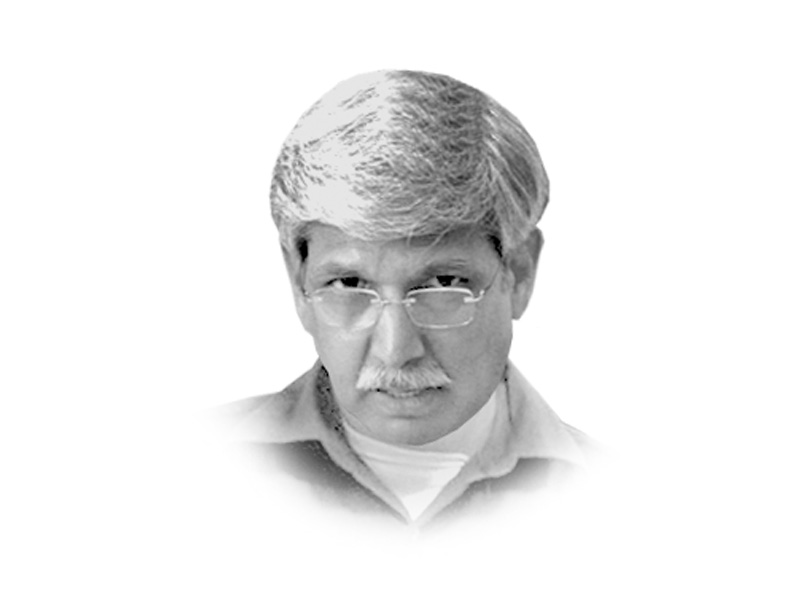
Nawaz Sharif has survived. He came across the first hump in his third tenure of premiership rather early; just over a year since he took power. That sounds strange as a democratic norm but that is what it really is — taking power. Never to serve. Does the basic fault lie in the political taxonomy of this country? The pundits and the apes could perhaps, first review that and see if changing terms can help. Back to the hump. Nawaz ran out of steam as he hit his first bump; yes, the ‘first’ bump. How many more exist; no one can tell. When does he topple over one; no one can tell. What is assured is, there will be more.
Even as parliamentarian after parliamentarian spoke to provide him succour in such trying moments of his premiership — and proved again and again that there simply wasn’t another way that the premier could move across the hump but for their shoulder — the PM sat grinning, unaware how every bit of his moral and political authority was being whittled away from under him. If certain decency and poise was brought back to the ‘august’ house it came via the suavity of someone as cultured and sophisticated as Senator Aitzaz Ahsan, who was incisive and truthful about what ailed Nawaz and his government. And it had all to do with Nawaz and his government. Will Nawaz learn though? This is the million dollar question. Or is it 60 million, these days.

In a very academic way, the three entities — the people, the government and the state — must gel to mutually benefit each other, and thus be of relevance to each other. When this construct is loosened or deliberately ignored, creating distance between any of these identities, the survival of the nation-state becomes questionable. The people and the state are the two primary elements in a hyphenated existence of a nation-state. The Constitution of Pakistan recognises that “sovereignty over the entire Universe belongs to Almighty Allah alone and the authority to be exercised by the people of Pakistan is sacred trust”, placing the onus indisputably on the people to exercise such authority “within the limits prescribed by Him”. The state then, both in the physical and in the metaphysical sense — since it is a part of the larger Universe as a construct, yet has boundaries and a physical definition — becomes the ownership of the people giving cause to the Westphalian notion of a nation-state. The people then choose representatives in the furtherance of a contract and appoint them to make laws that serve the people, function to smoothly run their (people) affairs; and make stronger both them (the people) and their state.
Ever since it has existed, inalienably stresses within such a relationship. Democracy acts as an overarching umbrella of norms that translate into letter the spirit of ensuring the basis of such mutually beneficial existence, and the functionality of such existence to enable continuation of a geographical, social and cultural entity that we define as a nation-state. Nawaz Sharif happens to be heading a government in such overt, yet complex underpinnings that must establish hopes, promises and their delivery. I don’t think to him though the notion of ‘power and government’ is as complex and encumbering.
It is worth quoting Harold Laski again from his almost a century old thesis of a mutually beneficial nation-state enterprise, though then in the Socialist context, that a “social order will be accomplished in peace” as long as the “process of legislation can offer solid benefits” while “translating the will of the electorate”. Also, “benefits must affect those who feel that they now have too small a stake in the existing order to make its preservation a matter of urgency to themselves”. That encapsulates the essence of a government-people relationship that should remain mutually sustaining. If a political order is to succeed, it must ensure common stakes. The people then ensure “preservation as a matter of urgency to themselves”. If not, they agitate, they gravitate and dislodge a non-performing order; be that in Moscow, St Petersburg, Kiev, Tahrir Square or the D-Chowk.
Najma Sadeque recently quoted Claude Frédéric Bastiat in The Nation, again from over a century and a half ago: “When plunder becomes a way of life for a group of men, they create for themselves in the course of time a legal system that authorises it and a moral code that glorifies it.” Constitutionalism in Pakistan’s recent political history has dangerous liaisons that dignify such formulations. There is popular refrain that the Eighteenth, Nineteenth and the Twentieth Amendments to the constitution reinforced the hold over the state of the political establishment graduating them to the overt ownership of what was only a leased entity through appointment. The people have become the forgotten part of this equation. State largesse and power in government are instead intertwined in a mutually beneficial relationship that feeds on each other.
Imran and Qadri have only exploited what had become a yawning gap in the nation-state construct and government-people relationship. They have espoused and then used public sentiment to garner their own political space; there being little altruism in anything political as a tradition. Their first attempt at challenging convention has moved them forward in correcting the anomalies that had become the norm. Yet, the destination in this quest is far, and the journey long. Both Imran and TuQ may have erred in different ways and should have paused at a point to consolidate their gains, but they too have overreached.
Now that conventional politics has prevailed, it can only emerge stronger. It already has taken the shape of another establishment, a cartel, that has evinced shared stakes and common interests in sustaining each of their political ilk. The people remain the only suckers in this game of Kingly turns where democracy is just a convenient cover. Politics Inc is here to stay. If it means a weaker nation-state, that is an unfortunate consequence.
Published in The Express Tribune, September 6th, 2014.
Like Opinion & Editorial on Facebook, follow @ETOpEd on Twitter to receive all updates on all our daily pieces.
COMMENTS (12)
Comments are moderated and generally will be posted if they are on-topic and not abusive.
For more information, please see our Comments FAQ













Et mod. when you did not publish my comments, show that the authors article is not appreciated by the express tribune and some of Pakistani readers. The Marshal is a brilliant intellectual of world class but being from the military has very archaic knowledge of People! The people are never the suckers, but the political leadership always miscalculates about the timing of revolution and change.
Rex Minor
OK...so what is the risk to our nation as a whole (a conglomerate of all the Inc.'s). So do we change anything because Bangladesh and soon Afghanistan start doing better than us on every front. No...what we (including IK and TuQ) have demonstrated is that the nation as a whole might as well suffer, the (personal) goals of few individuals is more important. The followers of IK and TuQ have clearly demonstrated this by not carefully analyzing the what if anything that can be achieved with their approach.
Let's take the example of Cricket and I know the author himself is a big fan of cricket. So we see that our team fairs poorly time and again and we have reached a point where we have decided to accept their performance as is and not stone them in front of the Supreme Court...right? What if the players knew that is what would happen to them if they lost miserably...could we have seen better individual and collective performance?
What I a mean is that if the selected or elected individuals fail to perform and they cannot be easily replaced then how or what do we need to do to get that outcome. Yes...IK and TuQ have failed in achieving their goals...but so have we as a nation...right?
@Kalash wala: Kindly re-read my comment it said......who / what and not huh / wha ....... :-)
Najma Sadeque recently quoted Claude Frédéric Bastiat in The Nation, again from over a century and a half ago: “When plunder becomes a way of life for a group of men, they create for themselves in the course of time a legal system that authorises it and a moral code that glorifies it.”
That, beautifully explains the 'Doctrine of Necessity' the PCOs, the LFOs and the 'Legal Systems' built around it.
And perhaps it also explains the 'Moral Code' called 'Ghairat'.
@Parvez: Huh? Wha? Is this a riddle?
In Quaid's Pakistan there is space for Politics Incp, but not for Military Incp. These self assumed Analysts who are Former retired khakis have damaged institution by advocating a political role. Corruption is a cancer which afflicts not just political elite, but paid civil and uniformed bureaucracy. Have we forgotten who started plunder of Pak Railways and under whose rule land barons assumed patronage?.
If Politics Inc is here to stay and seeing who / what they are all about ........ then pretty soon, if not already, the people will blame Military Inc for allowing it to happen.
Totally corrupt and incompetent Parliament , now members showing the ugly faces of each other . Every one has his own interests and safeguarding it . They have reached in the Parliment by taking the support of innocent public of Pakistan and instead of supporting them ,humailiting them . Further every one in the Parliament telling lie , when according to Foreign Ministery of China has clearly stated that there is NO Visit of Chinesee PM to Pakistan , than why these corrupt Politicians are crying ? The Parliment immediately be abolished and these politician must be hanged .
"Politics Inc is here to stay. If it means a weaker nation-state, that is an unfortunate consequence." Well, mercifully, it will replace Mil Inc. One step at a time.
The article has an incorrect article. It should be Civilian, Inc. What is glaringly missing is any reference to the very real Military, Inc. that has had and continues to have a tremendous suffocating influence over our nation-state. By the way we stopped being a nation since Gen. Ziaul Haq's dictatorship and are thus left with inadequate civilian leaders to look up to as a consequence. We civilians can do without any further confused beacons thrown at us by people of retired military backgrounds. We already know by bitter experience.
The author..er..co-oped columnist will be well advised to know that a great majority of educated Pakistanis never heard of Harold Laskis. Or of the Jungian philosophy or Carl Marx, or Clausewitz or Westphal. Never mind the average denizen, who can barely write his name, and who will help stone his daughter to death in front of the Lahore High Court. Nobody really cares who Najma Sadeque quoted. was it Claude the french hairdresser or Claude Frederick Bastait [was it spelled right? whew!] Quoting all these fancy names of dead authors shows the columnist has plenty of time on his hands. The every day working stiff needs leaders, politicians, go getters. Practical people, no time to sit in libraries and do an awful lot of reading. And about now, a Gandhi a Mandela a Jinnah is needed, none in sight. Truth be told, the people will settle for a used, second hand, Clinton. Country is teetering on the edge of an abyss.
So long as the Punjabi establishment pulls the strings, Pakistan will suffer.